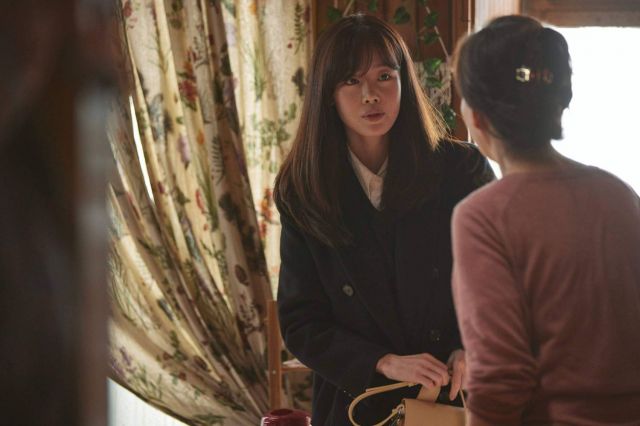[HanCinema's Film Review] "A Letter from Kyoto"
 By Panos Kotzathanasis | Published on
By Panos Kotzathanasis | Published on
The Korean indie film industry, with the exception of Hong Sang-soo, is definitely not on the same level as the mainstream one, with the productions of the like struggling to find a place within the local cinematic landscape. A way out however, is offered to a number of these titles, and most frequently family dramas, through (European) film festivals. "A Letter from Kyoto' is one of those films.
Advertisement
Hwa-ja has raised her three daughters by herself after her husband died, but now finds herself on the doorstep of elderly senility. One day, Hye-yeong, the middle daughter and the one Hwa-ja seems to be more proud of, returns to Yeong-do in Busan, after some issues in Seoul, without, however, having the courage to reveal to her family what has happened. Meanwhile, Hye-jin works in retail to support her family, while an Ukrainian worker seems to be interested in her. The youngest, Hye-joo dreams of going to Seoul and becoming a dancer after she graduates from high school. As Hwa-ja's situation deteriorates, the three sisters are forced to take a hard look at their lives and their relationship, while a letter written in Japanese Hye-yeong stumbles upon her mother's belongings, sheds light to a past of hers no one knew about.
Kim Min-ju-I directs a genuine indie drama, with the focus being on the characters and their interactions, through a relatively slow-burning approach that also ends up in a number of social comments. Probably the most interesting one is how much the four women, despite their differences, are alike, particularly in the way they hide a number of aspects of their life from each other. In that fashion, Hye-young keeps the events that forced her to come back to herself, Hye-jin does not mention the Ukrainian guy to anyone, as does Hye-joo about dancing, while the mother puts the cherry on top with her whole secretiveness regarding her connection with Japan. Of course, in this setting, talking about their thoughts and feelings to each other is completely out of the conversation, something that inevitably leads to a clash, in probably the most impactful scene in the movie.
At the same time, this scene and the type of catharsis it offers to the protagonists also works very well as a relief to the audience, considering that the secretive nature of all the women in the film and the mystery regarding the letter are essentially dispersed after that scene. Through this concept, Kim also comments on the issues caused by lack of communication, which seems to be an issue most Korean families face. On another note, this mystery regarding the mother's past adds a very appealing element to a narrative that would have been almost cliched otherwise.
Considering that the focus is more on people and their relationships and not events, the acting here emerges as a significant aspect, and Kim has managed to draw a series of very convincing performances from her actors. Han Sunhwa as Hye-yeong anchors the film as the protagonist, and is quite convincing in the way she tries to hide her inner turmoil, although particularly her older sister is obviously on to her. Cha Mi-kyung is excellent in the role of the deteriorating mother, with the moments she actually realizes that her mind is not working properly being the apogee of her performance. Han Chae-ah is also convincing in the role of the big sister who has taken up the weight of the world on her shoulders, with the moments she appears relaxed being quite amusing.
Kim Seon-hyeong's cinematography focuses on the realistic presentation of the settings the story takes place in, with the apartment in particular being portrayed as a suffocating place, at least for the most part. A number of more idyllic images later in the movie add some artistry in an overall work that is without particularly exaltations. Kim Min-ju-I's own editing results in a slow pace, on par with the indie dramas, in a fashion, though, that does not allow the movie to feel overlong.
In the end, one would find it difficult to say something negative about "A Letter from Kyoto", but at the same time, there is not exactly something particularly special about it. Fans of indie dramas (also of Japanese ones) will enjoy the movie in the festival they will watch it, but soon after another similar movie will take its place. On the other hand, Kim Min-ju-I seems to have some interesting ideas and an eye for composition, so watching what she will accomplish in the future is definitely intriguing.
Review by Panos Kotzathanasis
___________
"A Letter from Kyoto" is directed by Kim Min-ju-I, and features Han Sunhwa, Cha Mi-kyung, Han Chae-ah, Ko Jae-hyun. No release date in Korea yet.
 Panos Kotzathanasis
Panos Kotzathanasis
Panos Kotzathanasis is a film critic and reviewer specialising in East Asian Cinema. He is the founder of Asian Film Vault, administrator of Asian Movie Pulse and also writes for Taste of Cinema, Eastern Kicks, China Policy Institute and Filmboy. You can follow him on Twitter and Facebook. Panos Kotzathanasis can be contacted via sinkazama82@gmail.com.


